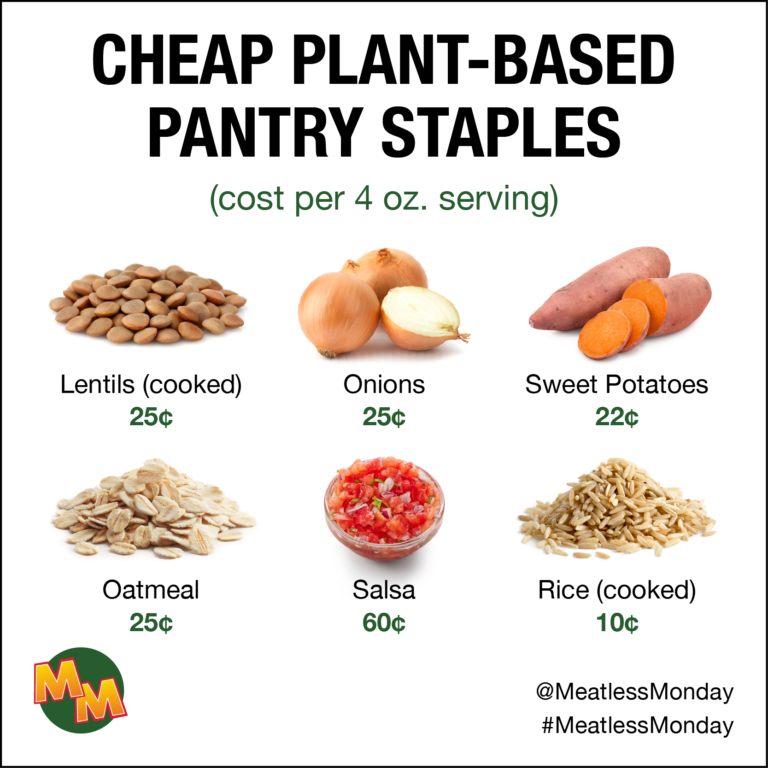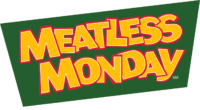Inexpensive Plant-Based Ingredients That Won’t Go Bad
Every food item will eventually go bad, but there are many food staples that offer a terrific value, can be prepared in big batches, and have an incredibly long shelf-life.
Some of these ingredients can serve as the centerpiece of a meal, like potatoes, beans, and pasta, while others act as supporting actors, providing quick bursts of flavor to ordinary dishes. Best of all, many of these foods are completely plant-based and rich in many of the essential vitamins and minerals necessary for a healthy body.
Our list of plant-based ingredients all have a shelf life of over two months (when stored properly) and are relatively inexpensive. But most importantly, these pantry staples give you the opportunity to get in the kitchen and experiment with flavors and ingredients that you may have overlooked in the past. And Meatless Mondays are always a great opportunity to start a new healthy ritual.

Beans
Often sold for less than a dollar a can, beans are the ultimate plant-based protein. With so many different types to choose from — kidney, black, pinto, cannellini, pigeon peas, butter beans — the recipe possibilities are endless. Make a stew, vegetable chili, bean salad, or these black bean meatless balls with zucchini noodles.
Diced Tomatoes (canned)
Take a simple stew, stir-fry, or sauce to the next level with a can of diced tomatoes. At only a buck a can, diced tomatoes will become your new secret weapon in the kitchen. Try adding them to this boldly-seasoned spicy chickpea ragout.
Frozen Fruits and Vegetables
Toss them into a blender, soup pot or sauté pan to add some nutrients and heft to your mid-week meals. When stored properly, frozen fruits and vegetables will last years (but please don’t make them wait that long). Some frozen vegetables — spinach, collards, broccoli rabe — should be thawed and drained before cooking, while others like broccoli, peas, and peppers can be thrown into a hot pan as-is and easily transformed into a garlic-ginger fried rice.
Granola
A bag of granola won’t run you much more than $4.00, depending on the brand, but it will impart an invaluable crunch to yogurt and oatmeal. Many manufacturers sell granola with a shelf life of up to six months, but it should be good to eat it even past that point (although it might not retain its full crunch).
Lentils (dry)
At $1.50 per pound, a bag of dried lentils is one of the best bargains in the grocery store. Besides an almost indefinite shelf life, the lentil contains a laundry-list of essential minerals like iron, folate, and manganese, is packed with protein, and is a great source of fiber. If you’ve never before cooked with dried lentils, start with a simple stew or this easy French lentil salad with cherry tomatoes.
Onions
When stored in the refrigerator, onions can last for up to two months (sometimes longer). They’re pretty cheap, too, costing only around $1.00 – $1.50 per pound. Sear on the stove top for a smoky, charred flavor or cook them low-and-slow to unlock their natural, caramel-like sweetness and sprinkle them over this sweet potato caramelized onion stew.
Oatmeal
Think of oatmeal as a blank canvas. Costing less than a quarter per serving, let your imagination run wild when it comes to cooking breakfast. Mix in everything from peanut butter, jam, nuts, seeds, or even savory spices. Dried oatmeal can last longer than a year when properly stored. Use oatmeal in this vanilla almond milk oatmeal or try using it to make dessert, like this apple cranberry oatmeal bread.
Pasta
Costing only $1.00 per box, your pantry should be loaded with pasta, but we recommend going beyond the standard semolina/durum wheat flour varieties and experiment with pastas made from whole grains, vegetables, lentils, and chickpeas. Try some unique flavor combinations to keep things interesting, like this recipe for green tea pesto pasta.
Peanut Butter
Whether you like it creamy or crunchy, peanut is the ideal pantry staple. A serving of peanut butter is packed with protein and healthy fats, both of which will keep you feeling nice and satiated. Peanut butter has a shelf life of more than a year (unopened), and many brands of sell for less than $2.00 a jar.
Polenta (corn meal)
Polenta is made by mixing cornmeal (dried, ground corn) with either water or milk. Inexpensive and versatile, polenta can serve as the foundation of any number of meals, pairing especially well with tomato sauce, like in this recipe for Italian white beans with kale and polenta.
Potatoes
These starchy staples don’t last forever, but when stored in a cool dark space they can last for between 2 – 3 months. At around .50 cents per pound, the potato is an excellent source of fiber, nutrients, and calories; they can add creaminess to soups or serve as a vessel for a delicious stuffed potatoes primavera.
Rice
Whether it’s white, brown, or wild, rice costs less than a quarter per serving. Rice can serve as an accompanying carbohydrate or act as the main meal. For a new take on everyone’s favorite grain, try this vegetarian biryani or meatless brown rice jambalaya.
Salsa
Jarred salsa is an excellent (and convenient) alternative to fresh varieties. Add a tablespoon to anything bean burritos and taco bowls to spicy puttanesca pasta and gallo pinto; mash some together with a ripe avocado and you’ve got a quick-and-easy guacamole.
Soy Sauce
Drizzle soy sauce into your stir fry, salad, sautéed vegetable, or tomato sauce for a boost of salty umami flavor. You can also use it liberally in this yummy Asian noodle bowl with spicy almond sauce. Soy sauce can cost as little as $2.00 a bottle and can last nearly two years after opening when stored in the refrigerator.
Sweet Potatoes
The sweet potato is nature’s candy; slice it down the middle and heat in the microwave for five minutes and out comes tasting reminiscent of a sugary soufflé. If you want to try making a dish that requires a little more technique, cook up this spicy and aromatic sweet potato chana or a coconut milk sweet potato white bean soup.
Vegetable Broth/ Bouillon
A box of vegetable broth is a staple of any kitchen, but you can expand your soup selection by adding some “chick’n” bouillon cubes to your pantry. Add some beans, frozen vegetables, and seasonings and you have a clean and simple dinner for around $1.00 per serving, or add some flour, nut-milk, and noodles for a creamy vegetable noodle soup.
Curious about what other plant-based ingredients you should be storing in your pantry? Check out our list of 20 Essential Meatless Monday Ingredients.
